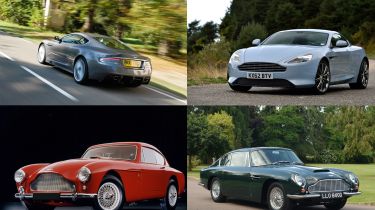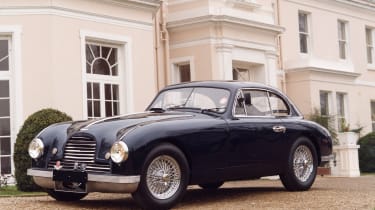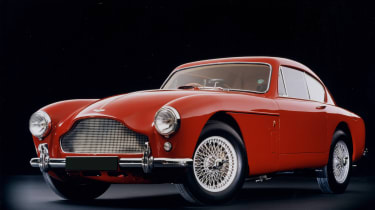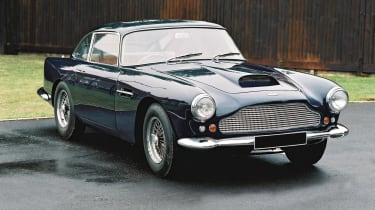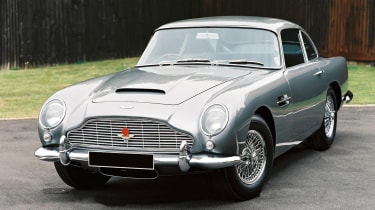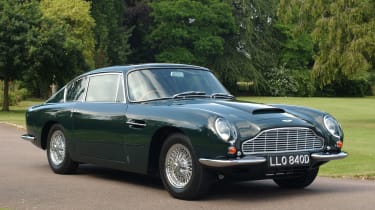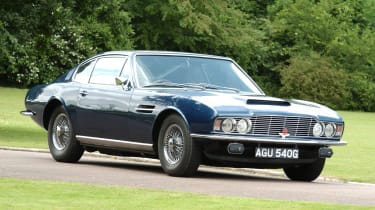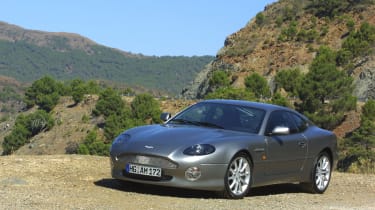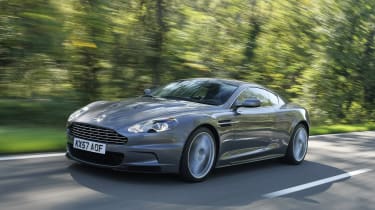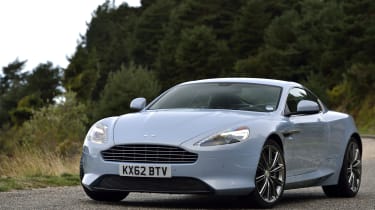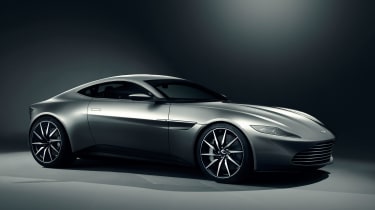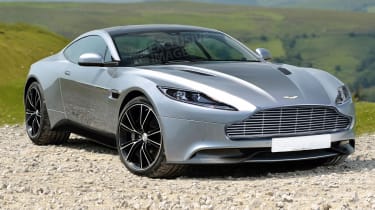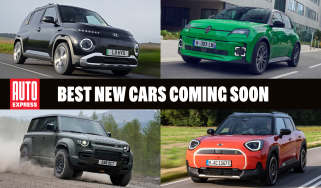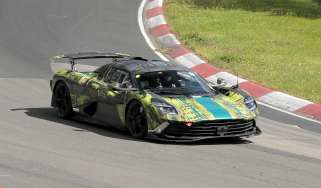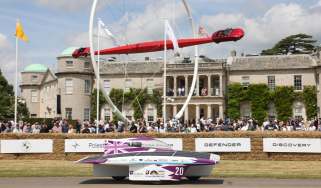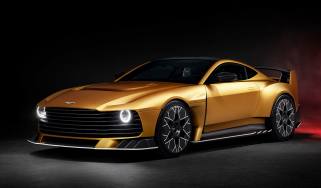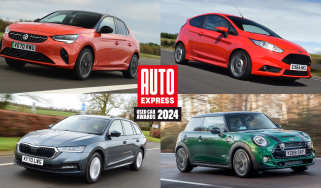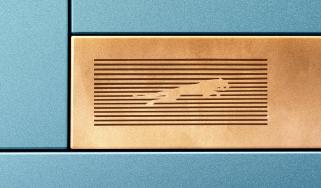Aston Martin DB series: a history from DB1 to DB11
As Aston Martin confirms that the next DB model will be the DB11, we chart the history of the classic bloodline from 1950 to 2015
Aston Martin is an evocative nameplate - one that conjures up different images for different people. Nostalgia fans might think of early Astons breaking records at the Brooklands racing track. Patriots will no doubt associate Aston martin with all that's great about British manufacturing and engineering. For most people around the world though, Astons are the car of choice for the silver screen's coolest secret agent - James Bond.
Ever since the DB5 appeared in 1964's Goldfinger, driven by the irrestistbly suave Sean Connery, Aston Martin has been linked with Bond. An Aston Martin has featured in ten Bond films so far, with an eleventh - Spectre - set to be released in October. The new film sees 007 driving a bespoke car created specially for the film, the DB10.
• Exclusive: Aston Martin confirms DB11 name for new coupe
Aston Martin has a chequered past. Founded in 1913, production of its cars was halted early on by the outbreak of World War I. After the war, the company was revitalised and had success racing cars at Brooklands, where they broke world speed and endurance records. Unfortunately the company went bankrupt in 1924 - then again in 1925 - and by 1926 both the original founders had left. The company changed hands twice more and produced small numbers of stunning sports cars until 1947, when it was acquired by David Brown Limited.
Sir David Brown was a tractor manufacturer, who purchased Aston Martin along with Lagonda in an effort to get into the road car business. Ever since it's been David Brown whose initials have adorned the best Aston Martin has to offer - the DB cars.
So with the DB10 coming to our screens soon, and conformation that the new Aston Martin DB11 is opn the way, here's our round-up of the Aston Martins that have been part of the iconic DB bloodline...
Aston Martin DB2 and DB2/4: 1950-1957
The first car to wear the DB nameplate was the DB2. The first Aston Martin to be equipped with a Lagonda engine, it featured a 2.6-litre straight-6 producing an impressive (for the time) 105bhp. The car was showcased at the New York Motor Show in April 1950 - partly because Aston needed to export as many cars as possible in order to secure supplies of steel, which were still scarce after World War II. Demand was huge, and the factory couldn't keep up, eventually producing 411 models.
The closed 2-seater coupe had success in the 1950 Le Mans 24 hour race where it ran using examples snatched straight from the production line - making it an even more attractive car to the affluent motorist. This car was given the DB2 name and was the first to carry the DB initials but the previous 2-Litre Sports model that only sold 15 units was retrospectively renamed the DB1.
The DB2/4 was based on the DB2, and added some minor styling tweaks. A then-uncommon body style was added to the range - a 2+2 hatchback known by Aston as a Sports Saloon. Power was increased to 125bhp, and later a 2.9-litre variant of the straight-6 engine was used, giving 140bhp.
Aston Martin DB Mark III: 1957-1959
After moderate success in racing with the DB3 and DB3S, cars that were never intended as production models, the DB Mark III was offered to the public and became the first car to introduce Aston Martin's iconic front grille. It was another evolution of the DB2, using the same 2.9-litre straight-6 Lagonda engine. Mechanical changes were widespread, including disc brakes, an optional automatic transmission and an optional dual-exhaust system, which raised power from 162bhp to 178bhp. An engine upgrade boosted this once more to 195bhp, which in 1957 made the DB Mark III a real hot rod. Due to the extra cost, however, this was only fitted on 10 cars over the DB Mark III's two-year lifespan.
The DB Mark III could be considered James Bond's first Aston Martin - he drove one in the novel 'Goldfinger' - but in the film adaptation this was replaced by the DB5. More on that later!
Aston Martin DB4: 1958-1963
The DB4 was technically another development of the DB Mark III - but its classical shape kick-started Aston's reputation for making truly beautiful cars. It also contained the first Aston Martin engine wholly designed under David Brown's ownership - a 3.7-litre straight-6, developed by legendary aston engineer Tadek Marek. This engien was prone to overheating - but owners forgave it thanks to a 240bhp output and top speed of 140mph. Models specified with a higher final drive ratio were even faster.
There were five 'series' of DB4, with styling additions including window frames and a barrade grille. The Series V had a larger body for more interior room - though smaller wheels kept the car the same height. All this however was just a precursor to the Aston Martin we know and love the best...
Aston Martin DB5: 1963-1965
Yes, the DB5 - 007's vehicle of choice. Nobody could have forseen the Aston Martin and Bond brands becoming so inextricably linked as a result of this fictional tie-up, least of all Aston itself. In fact, when the producers of Goldfinger called the company to request a car, Aston's top brass were reluctant. First they demanded that the car be purchased for the film, then they asked for it back completely unscathed. Eventually they agreed to a product placement deal, kick-starting a partnership that lasts to this day.
The DB5 is Bond's favourite car, and no self-respecting secret agent would drive a car without gadgets. The production team added a revolving license plate, an oil slick dispenser, an ejector seat and wheel-destroying spikes deployed from the hubcaps. The standard DB5 was less lavishly equipped, but still contained a 4.0-litre straight-6 with 282bhp mated to a five-speed gearbox. More importantly, the beautiful bodywork - built to superleggera patent technique - has become a classic motoring icon and one of the most recognisable shapes in the car world.
The DB5's been used in several Bond films since. One of the vehicles from Goldfinger was used in the following film, Thunderball. The Db5 then returned in Goldeneye, Tomorrow Never Dies, Casino Royale, and most recently in Skyfall, where it was tragically destroyed by gunfire.
Aston Martin DB6: 1965-1971
At a quick glance it's quite difficult to tell this car apart from its predecessor and when it launched the DB6 already looked a little dated. Updates were made to the car's aerodynamics as engineers found that the tail of the DB5 caused the rear to lift when going quickly, reducing traction. To counteract this a 'Kamm-tail' was added.
Though Bond never drove a DB6, it does have a notable celebrity owner who's just as effortlessly cool and mysterious... Prince Charles owns a DB6 Volante convertible. Converted to run on organic bioethanol, it was a 21st birthday present from his mother.
Aston Martin DBS: 1967-1972
Breaking with the numerical naming tradition, the DBS bought in a much more modern design language for Aston Martin. The squarer shape and fastback tail were very much 'in vogue' in the late 1960's and provided more interior space.
The original plan was to use a V8 engine, but this wasn't ready in time for the cars launch so it continued with the straight-6, once again providing 282bhp. Later on though, Tadek Marek's V8 was inserted into the car. The DBS V8 continued in production until 1972 with alloy wheels rather than the wire ones seen before, and after 1972 it was facelifted and simply renamed the Aston Martin V8. It's another Bond Veteran, having appeared in 1969's On Her Majesty's Secret Service.
Aston Martin DB7: 1994-2004
The DB nameplate was retired from 1972 until 1994 when the DB7 was launched. Conceived as a smaller, cheaper Aston Martin to be sold alongside the larger V8 models, it made use of new owner Ford's facilities and ties with Jaguar to produce a model with many similarities to the Jaguar XJS. It was the first Aston since the DB6 to feature a more 'rounded' bodystyle and despite a comparatively heavy steel body, the supercharged straight-6 was able to move it along at a tidy pace.
Later on a V12 engine option was added to the range in the DB7 V12 Vantage. This bought the performance that the chassis deserved, with 435bhp and 540Nm of torque. A convertible Volante version was available with both engines, and the DB7 also spawned the DB7 Zagato, a bespoke coachbuilt model limited to just 200 examples.
But the DB7 has never been about the performance. The real draw is instantly obvious when looking at it - the Aston Martin DB7 is widely considered one of the prettiest cars ever built.
Aston Martin DBS V12: 2007-2012
Three years after the last DB7 rolled off the production line, the DBS name was bought back for the impossibly pretty second-generation model. Thrust into the public eye thanks to another Bond film, Casino Royale, the DBS was a replacement for the Vanquish S and took on the mantle as flagship of the range.
During Casino Royale the DBS was launched - quite literally - into the record books by performing seven cannon rolls during the high-speed chase scene. A DBS was also used in the chase around Lake Garda during the beginning of the films successor, Quantum of Solace.
The DBS used a 6.0-litre V12 engine producing 510bhp - enough to power the car from 0-62mph in just 4.3 seconds - so this incarnation of the DBS has the performance to match its looks.
Aston Martin DB9: 2004-
The DB9 actually came along before the second-generation DBS - but it's proven to be the more enduring car, as it's still in production today. A timeless combination of a sophisticated chassis and 6.0-litre V12, wrapped up in a stunning grand tourer body style that still looks modern 11 years on, the DB9 has proven to be one of Aston Martin's most successful cars.
Numerous special editions of the DB9 have been produced - from a Year of the Dragon model with 24-carat gold badges and unique embroidery on the headrests, to stripped-out racing models. There's also a Volante convertible which somehow manages to be even sleeker looking than the coupe.
The DB9 has never appeared in a Bond film, but you can read about the special DB9 Bond edition here. It was created to mark the release of Spectre, the latest 007 flick.
Aston Martin DB10
007 returns to our screens later this month in Spectre, and Aston Martin has produced a very special vehicle for him to drive. Called the DB10, it's a bespoke car made specially for the movie, and celebrates fifty years of the two brands being linked. It features modified V8 Vantage running gear, with a larger body using truly unique design touches. Only ten of these cars were made though, and they're all for film use. Given Bond's track record for destroying cars, it'll be impressive if any of them make it out unscathed.
Aston Martin DB11 and beyond...
Aston Martin has officially announced the next DB it will produce will be called the DB11. Under the bonnet is expected to be a development of the existing Aston Martin V12, possibly with turbocharging for added power and efficiency. It'll also get a brand new interior with Mercedes-sourced sat-nav and switchgear.
What's your favourite Aston Martin DB car? Let us know in the comments section below...
